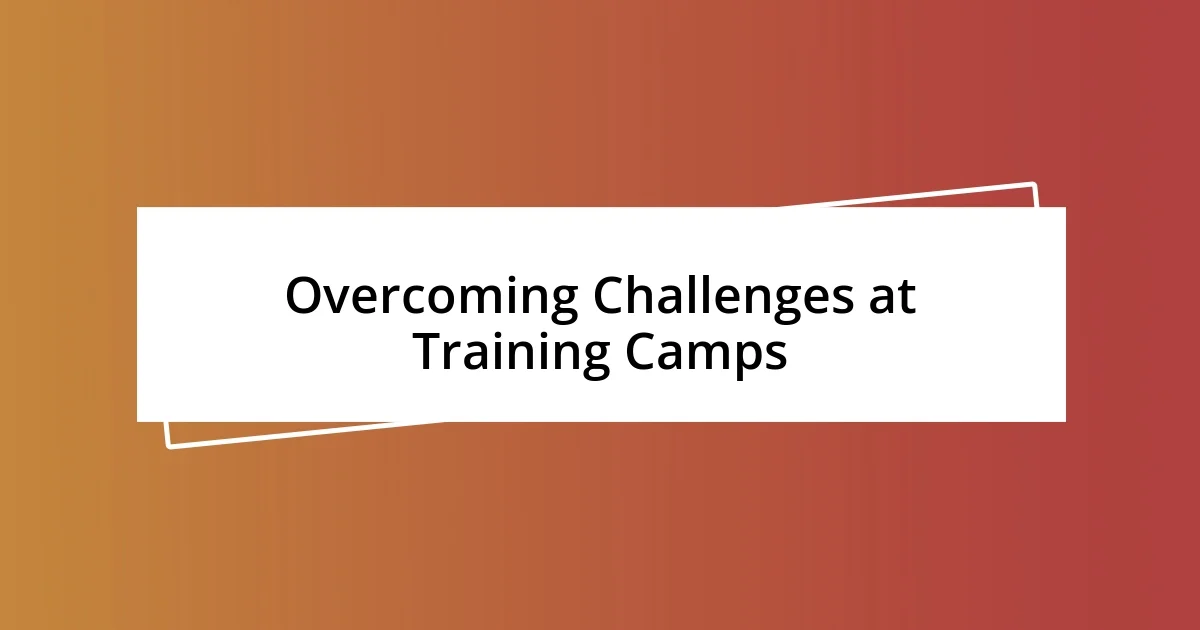Key takeaways:
- Youth training camps promote personal growth through activities that encourage resilience, teamwork, and leadership skills.
- Choosing the right camp aligns with a young person’s interests and values, significantly influencing their development and engagement.
- Friendships and networks formed at camps are lasting and create a supportive community that encourages ongoing personal and professional growth.

Introduction to Youth Training Camps
Youth training camps hold a special place in the journey of personal development and skill enhancement for young individuals. I remember attending my first camp, filled with excitement and a bit of nervousness, as I stepped into a world that promised both challenge and growth. Have you ever felt the thrill of embarking on a new adventure that pushes you beyond your comfort zone?
These camps offer a unique blend of discipline, teamwork, and fun, allowing youth to explore their interests and potential in a supportive environment. I often reflect on my time engaged in various activities—whether it was sports, arts, or leadership training, each experience shaped me in unexpected ways. It’s astonishing how these environments can create lifelong friendships and unforgettable memories.
Moreover, the essence of youth training camps lies in their ability to foster resilience and adaptability. I still think back to the moments when I failed at a task but got back up with encouragement from fellow campers. What valuable lessons have you learned from your own experiences in youthful challenges?

Choosing the Right Training Camp
Choosing the right youth training camp can be a game-changer in a young person’s development. I remember a time when I thought all camps were created equal, but that couldn’t be further from the truth. Each camp has its own focus and philosophy, which can dramatically influence the experiences and skills a camper gains. For example, selecting a camp that aligns with a participant’s interests—not just in activities but in values—is crucial for fostering genuine engagement and growth.
When evaluating potential camps, consider these key factors:
- Focus and Specialization: Look for camps that offer specific training in areas of interest, such as sports, arts, or leadership.
- Camp Philosophy: Research the camp’s approach—are they focused on personal growth, teamwork, or competition?
- Staff Qualifications: Inquire about the experience and training of camp leaders; their expertise can greatly enhance the learning experience.
- Camper Testimonials: Personal experiences shared by past campers can provide valuable insights into what you can expect.
- Location and Facilities: The environment can significantly affect your experience, so think about whether you want a rural or urban setting.
Choosing wisely made all the difference for me; it guided my learning journey and helped me forge connections that still matter today.

Activities Offered in Training Camps
During my time at youth training camps, I found that the activities offered were not just varied but incredibly enriching. From team sports like soccer and basketball to creative endeavors such as painting and drama workshops, every option encouraged meaningful participation. I distinctly remember the exhilaration of playing capture the flag, where every sprint and strategic move felt like a life lesson in teamwork and communication.
What truly stood out for me was the leadership training sessions. I participated in group exercises that simulated real-world challenges—such as how to resolve conflicts or motivate peers. I still recall leading a small group for the first time; the pressure was intense, but it taught me the importance of clear communication and listening to each team member’s ideas. Have you ever been in a position where your decisions directly impacted your team? That experience reminded me that leadership is more about serving others than it is about authority.
Finally, camps often incorporate community service activities, which I found deeply rewarding. One summer, we volunteered at a local shelter, and I was surprised by how meaningful it was to give back while building friendships along the way. It made me realize that the true essence of these camps extends far beyond personal skill development—it’s about making connections, cultivating empathy, and growing into a well-rounded individual.
| Activity Type | Benefits |
|---|---|
| Team Sports | Enhances teamwork and physical fitness |
| Creative Workshops | Boosts creativity and self-expression |
| Leadership Training | Develops confidence and decision-making skills |
| Community Service | Fosters empathy and social responsibility |

Personal Growth through Camp Experiences
Experiencing a youth training camp opened my eyes to the immense potential for personal growth. I remember a specific moment during a morning circle where we shared our goals. Listening to others express their dreams pushed me to articulate my own, illuminating the pathways I wanted to explore. It made me wonder—how often do we get the chance to reflect and refine our aspirations in such a supportive environment?
Throughout my time there, I faced challenges that were both daunting and exhilarating. I think of the ropes course, where I was terrified to step off the platform. However, with encouragement from my peers, I finally took that leap of faith. That moment taught me not only about overcoming fear but also about the power of collective support. It’s incredible how a single experience can shift your mindset from self-doubt to self-belief.
I also cherished the friendships that blossomed during these camps. I recall late-night discussions under the stars, where I found solace in shared stories and vulnerabilities. These interactions shaped my understanding of authenticity and connection in relationships. Have you ever felt a bond form so quickly? It’s in those moments that I recognized the importance of surrounding myself with people who inspire growth, illustrating how camp experiences can deeply enrich our personal development.

Building Lasting Friendships and Networks
During my time at youth training camps, I developed friendships that have lasted well into adulthood. I still remember the bonds formed over shared experiences—like when I teamed up with a fellow camper to tackle the dreaded mud obstacle during the adventure race. We laughed and cheered each other on, drawing others into our camaraderie. That shared goal created an unbreakable connection; it’s amazing how moments of challenge can forge friendships that stand the test of time.
Networking isn’t just about collecting contacts; it’s about nurturing relationships. I had the chance to meet people from all over, each with their own unique backgrounds and stories. Even now, I occasionally reconnect with camp buddies for advice and support. It’s fascinating to look back and realize that those informal conversations around the campfire laid the groundwork for a network of friends and mentors. Have you ever found a mentor in an unexpected place? That’s the essence of youth training camps—they cultivate relationships that can propel us forward in life.
Reflecting on these experiences, I realize how vital these connections are for personal and professional growth. I still utilize the skills I learned about collaboration and communication when working with others. The friendships formed during those formative years have been assets throughout my journey, providing me with a support system that encourages growth. Isn’t it incredible how a few weeks of shared activities can create a network that feels like family? It’s a testament to how profound and lasting those relationships can be.

Overcoming Challenges at Training Camps
Navigating challenges at training camps often requires a blend of resilience and adaptability. I remember a particularly grueling hike that tested not just my physical limits but my spirit too. Halfway through, exhaustion kicked in, and I questioned whether I could continue. But in that moment of doubt, I saw a teammate struggling as well; we pushed each other, reminding ourselves that perseverance was key. This experience deepened my understanding of teamwork—sometimes, just knowing you’re not alone can make all the difference.
There were moments when I felt overwhelmed by the demands of the camp, like during a skills assessment I initially dreaded. I found myself comparing my abilities to others, which only heightened my anxiety. However, a mentor stepped in with perspective, emphasizing the importance of personal progress over competition. That’s when I truly learned to embrace my own pace. Have you ever been surprised by how a simple shift in mindset can transform your outlook?
Reflecting on my journey, I realized that overcoming obstacles wasn’t just about physical feats; it was also about emotional growth. Each challenge faced—be it facing a fear of heights or pushing through fatigue—contributed to my evolving self-confidence. I now see those hurdles as stepping stones. Isn’t it fascinating how the most challenging moments can leave us with the most rewarding lessons? In hindsight, every struggle at camp helped shape the person I grew into, teaching me resilience I carry into every aspect of my life.












